Peter Cronau finds the latest Lowy polling encouraging: despite the pro-war stance of most mainstream media, the public — particularly younger people — are not persuaded.
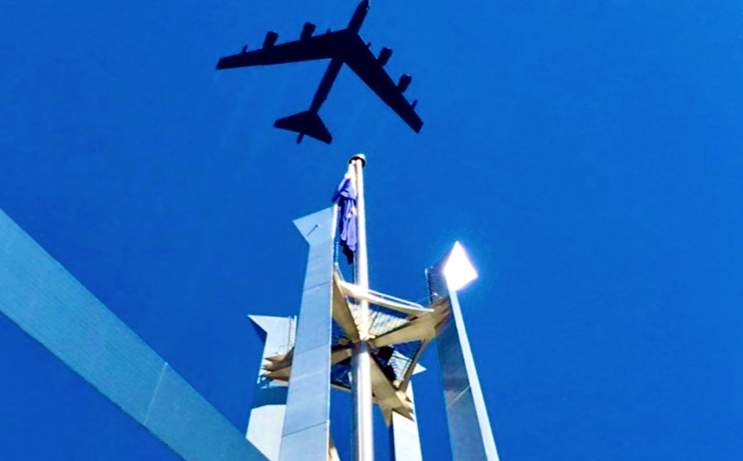
A US Air Force B-52 nuclear bomber flies over Canberra’s Parliament. (Declassified Australia, photo supplied)
By Peter Cronau
Declassified Australia
 A majority of Australians (51 percent) want Australia to adopt a policy of neutrality when it comes to considering a U.S. war against China, according to the latest polling by the Lowy Institute think tank.
A majority of Australians (51 percent) want Australia to adopt a policy of neutrality when it comes to considering a U.S. war against China, according to the latest polling by the Lowy Institute think tank.
The poll, conducted in 2022, reinforces earlier polling by the Lowy Institute that found most Australians, while happy to support military involvement in humanitarian interventions or peacekeeping, do not want the country to support U.S. military action in a war against China – and the number of Australians saying this is increasing each year polled (2020 63 percent, up from 2013 60 percent).
This runs contrary to mainstream media representations of such polling that it’s worth stating again: The latest polling says a majority of Australians say they want Australia to maintain “neutrality” in any U.S. military conflict with China over Taiwan.
At a time of hysterical pro-war reporting in many of Australia’s major mainstream news outlets, the views of the Australian public against the U.S. alliance and the U.S. push for confrontation with China, should gain some higher prominence — if Australia’s media was interested in balance, a democratic majority view and Australia’s national interest.
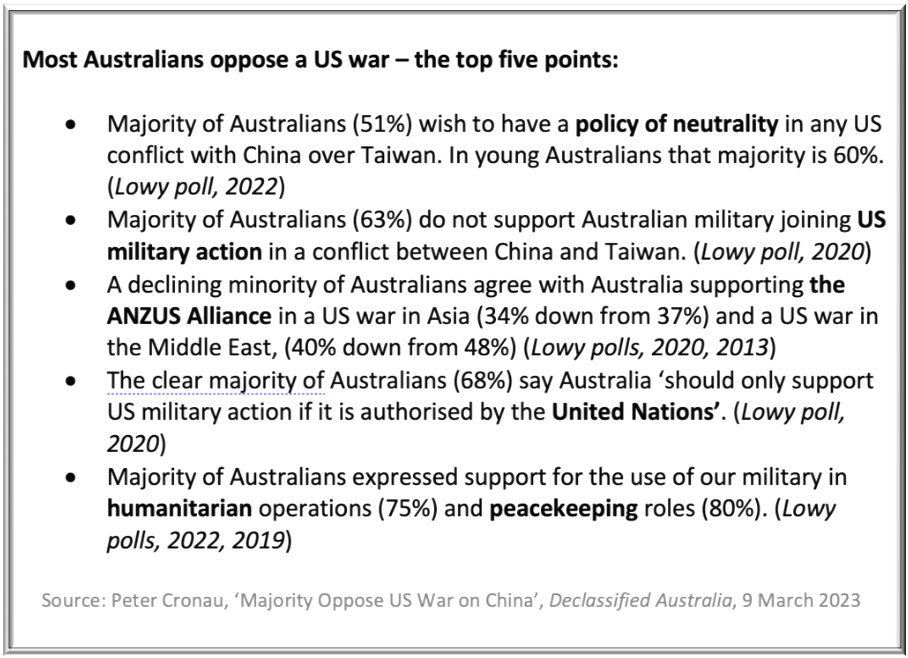
Low Support for US War with China
The earlier poll conducted in 2020 found 63 percent of Australians do not support Australian military joining U.S. military action in a conflict between China and Taiwan. The opposition to U.S. military action against China has increased [archived here] by 9 percentage points from 2019, when 54 percent were against such military action.
Since that remarkable result, the Lowy Institute changed the polling question slightly in 2021 and 2022, but despite that they still found that most Australians want the country to remain neutral in any U.S. military conflict with China over Taiwan.
[READ: “Mammoth submarine outlay sparks budget battle in Australia” ]
Elsewhere the report asked a separate, different question about if China “invaded Taiwan.” This saw Australian opposition to sending military forces that was at a majority of 54 percent in 2019, dropping to 47 percent in 2022. This near repetition of an earlier question in the same poll may seem odd, but it may be a case of asking varying versions of a question until finding the “right” answer.
The Lowy pollsters seem to talk down the notable result on neutrality when they state: “A bare majority say Australia should remain neutral… almost half say Australia should support the U.S. in this conflict.” [Emphasis added]. A majority is still a majority in most democracies.
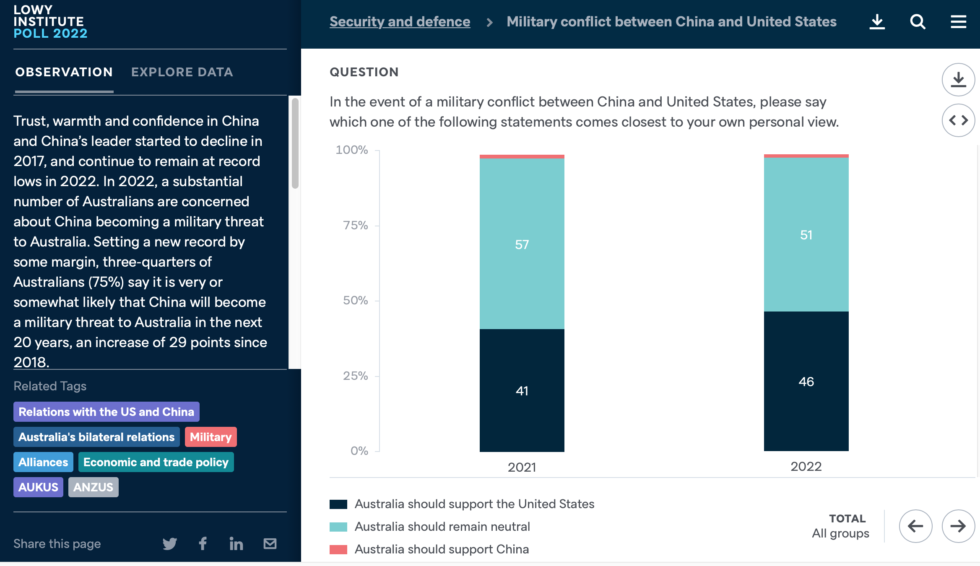
The 2022 Lowy Institute Poll has shown what Australians think of prospects of war between US and China:
Australians want a policy of neutrality. (Lowy Institute)
What is fundamentally clear from this polling, however, is that in most polling the majority of the Australian public has made it known they do not want Australia to join a U.S. war against China over Taiwan.
Support for ANZUS Alliance Low
Australian “support” for joining the U.S. in any conflict under ANZUS, the Australia, New Zealand and U.S. military alliance, is also waning, the 2020 Lowy polling also shows.
A minority (40 percent) of Australians in 2020 agree with Australia supporting the U.S. under the ANZUS alliance in a war in the Middle East, a reduction from 2013 when 48 percent supported such action under the alliance. And that was prior to the debacle in Afghanistan, the Taliban’s victory and Australia’s hasty retreat in 2021.
Even fewer Australians support alliance action in their own region. In 2020 a smaller minority of just 34 percent of Australians agree with supporting the U.S. under the ANZUS alliance in a war in Asia, a decrease from 2013 when 37 percent supported it.
The clear majority of Australians (68 percent) in 2020 say Australia “should only support U.S. military action if it is authorised by the United Nations.”
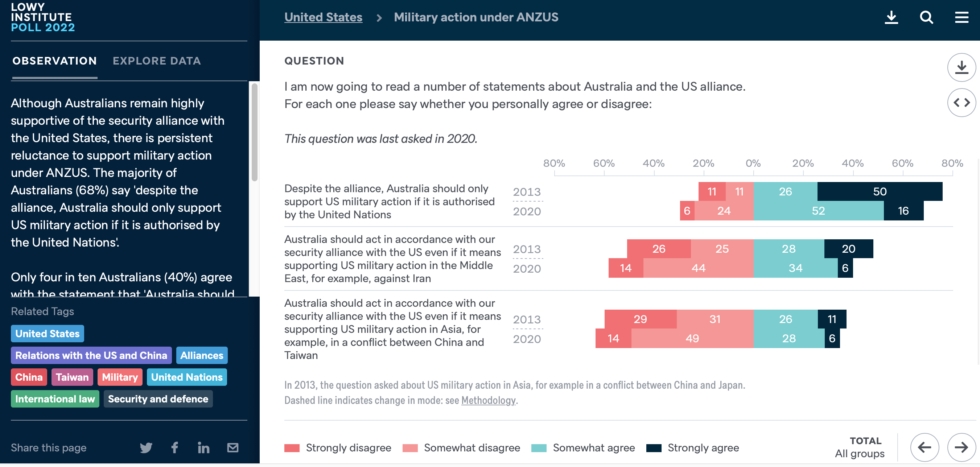
The 2022 Lowy Institute Poll has shown what Australians think of prospects of military action under ANZUS:
Australians don’t want to be a part of it. (Lowy Institute)
However, with all statistics, it depends on what questions are asked, and what answers are publicised. The Lowy report emphasises an obvious truism when it asks a different question in the 2022 poll, showing a majority of Australians generally consider the U.S. alliance as “important.”
This “motherhood” question allows pro-war media to shout: “Most Australians say Alliance is important.” But while they may say it’s important, Australians don’t actually support it being used for Australia to join U.S. wars.
The 2020 Lowy report very clearly states: “There is persistent reluctance to support military action under ANZUS. The majority of Australians (68 percent) say ‘despite the alliance, Australia should only support U.S. military action if it is authorised by the United Nations.’”
This would indicate that most Australians would rather support the U.N.-based “international legal order” than the U.S.-designed “rules-based order.”
Other polling supports this finding. A 2022 poll by the U.S. Studies Centre shows that a large majority of Australians (76 percent) believe Australia should “develop a foreign policy that was independent of the global powers.”
US-China War Not in National interest
A further question in the Lowy poll shows that Australians, despite their antiwar majority, understand well the current state of Australian democracy. They know that their wishes face headwinds in being translated into actual policy, and that, as with the Iraq war, it is probable they will be ignored and be dragged against their will into the next conflict.
The 2022 polling analysis shows 77 percent, the large majority of Australians, acknowledge the grim fact that “Australia’s alliance with the United States makes it more likely Australia will be drawn into a war in Asia that would not be in Australia’s interests.”
They call it democracy but know they have little input to any decision to commit the nation to war. That’s because the decision lies solely in the hands of the prime minister of the day, not in the elected Parliament. A majority of Australians would like to see that changed too.
The sceptical public has decided. After 20 years of illegal and failed wars led by the United States, Australians are increasingly making it clear they have had enough. The collapse of all the dubious rationales for war have been noted by most of the population.

An estimated 240,000 were killed during the 20-year failed allied occupation of Afghanistan — most of them Afghan citizens. Here the body of one Australian soldier, Sgt Blaine Diddams of SASR, is returned home to his family and friends waiting at RAAF Base Pearce, Western Australia, on 9 July 2012, after being killed in a clash the Chorah region of Uruzgan Province, Afghanistan. (Cpl Chris Moore)
Australians have seen through the lies over the non-existent Iraqi “weapons of mass destruction,” the dismal failure of the “nation building” experiment in Afghanistan and the thin arguments for Australia’s secretive war against Syria. And now, that well-founded scepticism has affected their views of a prospective war with China – they don’t want any part of it.
Fear-Mongering Up, Fear Up
Polling has seen Australians’ overall perception of safety drop, and fear levels jump. Is it little wonder? The high media prominence in 2022 of the new war between Ukraine and Russia, and repeated confrontations with China by U.S. and Australian military ships and planes, has guaranteed that.
Over the past year, polling shows fear levels rose of China becoming “a military threat in the next 20 years” with 32 percent now seeing in as “very likely,” up from an average of 16 percent with that view over the past decade.
The Lowy Institute’s head of polling, Natasha Kassam, says, “Anxiety about China has characterised Australian public opinion for the past three years, and now the vast majority of Australians believe China will pose a military threat to Australia in the next two decades.”
But that growing fear of the prospect of war with China is tied up in Australians’ overall wariness of the United States, and has not translated into a belligerent attitude against China.
Despite all the voices of the pro-war lobby on China, the scare-mongering by think tanks, the spruiking (publicizing) by the weapons merchants, the malign leaks to journalists, the assurances by defence officials and dubious assertions of their political leaders – it seems the public is awake to them.
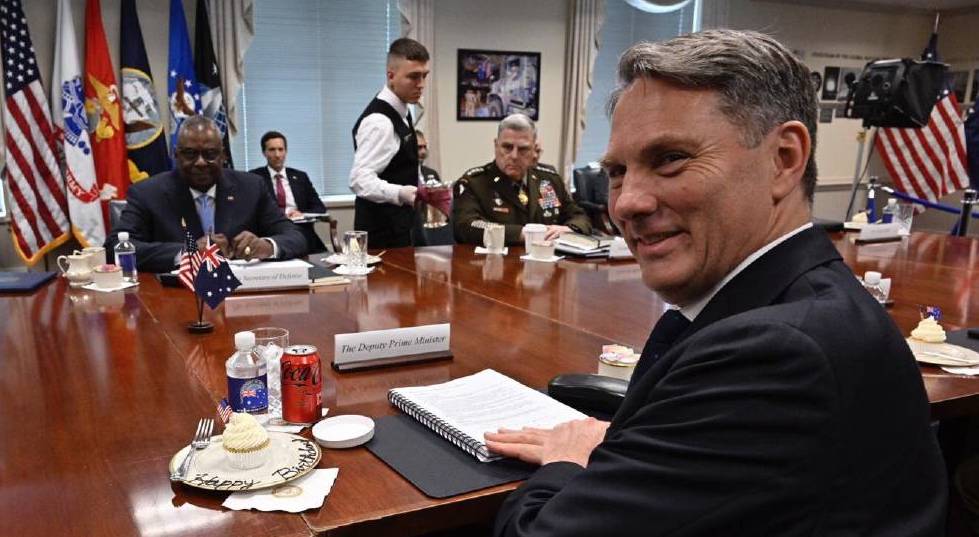
Cracking a smile after being given a birthday cupcake, Defence Minister and Deputy Prime Minister Richard Marles with U.S. Defense Secretary Lloyd Austin and General Mark Milley, chairman of the U.S. Joint Chiefs of Staff, July 2022. (Defence Department)
It is perhaps surprising to see that, in the face of all this, the public’s support for a U.S. war against China is actually persistently dropping.
Those pro-war voices may not have adequately considered that Australians live in a democracy. They could start to acknowledge this by reflecting the public’s view in statements and reporting, and policy.
The singularly pro-war stance of most mainstream media outlets has not convinced the majority. So expect a boost to the fear-mongering, more tales of spy cells, strange cyber hits, media embeds with military forces, smiling U.S. generals, new “cool” attack warplanes, a rise in the U.S. cultural push, and more empathy-building stories of nice Americans surviving terrible storms in Texas.
A recent news media special, published by the Sydney Morning Herald and The Age, titled “Red Alert,” is an example of the biased reporting. The series would have been better titled “Red Scare.”
The large, three-day special report relies on five “experts,” but the article fails to say four of them are connected to a highly controversial think tank — the Australian Strategic Policy Institute (ASPI) — as staff, board member or contributor. Nowhere are the pro-war stance, foreign government funding, and weapons industry connections of ASPI mentioned.

The alarmist “Red Alert” reports in the Sydney Morning Herald and The Age on March 7, 2023, gave an increasingly common biased “red scare” line that is countered by independent media carrying a range of views, such as Declassified Australia, Pearls and Irritations, Consortium News and Michael West Media.
Despite such media abuse, the public remains consistently opposed to U.S. wars. The inability of the mainstream media to convince the majority is in fact driving their readers and viewers away.
The Danger in a Kind Heart
There are other positives that the majority of Australians can take away from the Lowy polling.
While the majority of Australians oppose war, they overwhelmingly support the use of Australian military forces for humanitarian operations and in peacemaking and peacekeeping roles. Between 75 and 80 percent of Australians expressed support for such military operations in the 2019 and 2022 polls.
But there is danger here. Those pushing Australia to war may be guided by this polling result and therefore dress up their arguments in words about “humanitarian war” and “peacekeeping.” The overwhelming public goodwill towards the peacekeeping and humanitarian missions to assist the people of East Timor (1999-2007) and Bougainville (1998-2004), is open to being abused by the pro-war lobby.
The public should be on the lookout for pro-war voices using humanitarian justifications to advocate for Australia to join the U.S. in their next war against China, as the Lowy poll put it, “to stop a government from committing genocide and killing large numbers of its own people.”
The pro-war voices may have an increasingly difficult task, however, as they face being washed away by a generational tsunami. Polling shows that support for the United States is lowest, and declining, amongst young Australians. This is an amazing “fact on the ground.”
While 43 percent of people over 45 say Australia should remain neutral in a military conflict between the U.S. and China, a whopping 60 percent of Australians aged 18-44 prefer neutrality, according to the Lowy’s 2021 and 2022 polls.
Expect the pro-war voices to increasingly target younger audiences.
Pushing the Polling
“Australia’s new government will find support [in the polling results] for more defence spending, tough policies towards China and Russia, and stronger engagement in our region and on the world stage,” claims the Lowy Institute.
However, what it won’t find is a high level of support for U.S. wars, including against China.
The Lowy polling is an important measure of Australian opinion towards the U.S. It is watched closely by foreign affairs and defence officials in Canberra and in Washington.
The polling each year contains a grab-bag of information, with something for everyone. The actual results showing a drift from the U.S. alliance and a favouring of neutrality, have been de-emphasised in much of the news reporting which has been dominated by the war in Ukraine and the fanning of a war with China.
The particular poll results preferred by the pro-war lobby will be wheeled out, and will be gleefully repeated in much of the media. But this examination of the polling results show there is a hopeful message in the actual attitudes of Australian, if only we are told of them.
Peter Cronau is an award-winning investigative journalist, writer, and film-maker. His documentaries have appeared on ABC TV’s Four Corners and Radio National’s Background Briefing. He is an editor and cofounder of DECLASSIFIED AUSTRALIA. He is co-editor of the recent book A Secret Australia – Revealed by the WikiLeaks Exposés.
This article is from Declassified Australia.
The views expressed are solely those of the author and may or may not reflect those of Consortium News.

Don’t be naive, NOTHING has changed here in Australia since all the Way with LBJ .
Whenever the USA plans or starts another of their beloved WARS she always cries for HELP from the Australian Military to fight and be killed for them. Our stupid Australian POLITICIANS will always do what the USA orders them to do !!
It does not follow that there will be any war with China.
The United States, declining as it is, will pillage its ally states – here, selling expensive weapons that may never be used.
Whereas China and Russia can sell infrastructure development and prosperity, Washington sells security, threats and then armaments.
____________
But ally states fail to heed the lessons of The Ukraine, presently favoured Washington ally, until it is not. And so . . .
Narrative Collapse – – –
Only when the last American artillery shell has been fired in The Ukraine, only when the last Ukrainian soldier has been killed in The Ukraine and only when the last of Ukrainian state territory has been irretrievably lost from The Ukraine will The Americans and Europeans finally realize that History Favours Russia and disfavours them . . .
hxxps://les7eb.substack.com/p/washingtons-war-part-viii-narrative
In the 1980s the Mulroney government was pushing for a free trade agreement with the US. They commissioned monthly polls which consistently showed that the majority of Canadians were against such an agreement. The polls continued until finally a result showed a majority in favour of free trade. Then the polls stopped.
Polls tell you they are accurate within x% (depending on sample size), 19 times out of 20. In the case of monthly polls that means that one can expect an outlier result within a year more than half the time. And of course results that fall within the margin of error should be considered indeterminate (although that won’t stop the I-told-you-so crowd which, unfortunately includes politicians and pundits).
The current article focusses on the trend of the results, which is what polls are good for. But just beware when the polls stop.
Thanks, Consortium News for running this important article. Yes, without any doubt at all, the majority of Australians object to the actions of the PM, the Minister for Defence (a.k.a. the Deputy PM) and the Minister for Foreign Affairs in their apparent attempts to get a stranglehold on public opinion in this country, now a vassal state to the world’s #1 criminal.
The media propaganda we have experienced in the last week from almost all the media, Murdoch and the football networks, the likes of which we have never seen before, reflects the sad fact that media worldwide is under the clear dictates of the US administration.
25 million Australians antagonising 41 times their number in China, engineered by politicians who have been in their seats of power for less than a year, but subservient to the US since 1945.
What a climate. How can young Australians adjust to the likely scenario of war, just around the corner. Their future is questionable.
Yes Rex, Australia is a USA vassal. The ALP wishes never to endure a repeat of the 1975 Whitlam Coup and is now the “Australian USA Party”. Those who thought nobody could be more compliant than Peter Dutton / Marise Payne will be impressed by Richard Marles / Penelope Wong. Their subservience to US power raises the bar. The citizens are irrelevant.
The corporate media are the gatekeepers of the Western imperial project. Their support is slipping badly which should give us all hope. Without the manufacturers of consent, the empire managers will lose all support. Long overdue.
“Majority of Australians Oppose US War on China”
Seems China is in agreement:
“China has accused the US, UK and Australia of embarking on a “path of error and danger” in response to the Aukus partners’ announcement of a deal on nuclear-powered submarines.”
“The latest joint statement from the US, UK and Australia demonstrates that the three countries, for the sake of their own geopolitical interests, completely disregard the concerns of the international communities and are walking further and further down the path of error and danger,” China’s foreign ministry spokesperson Wang Wenbin said during a regular press briefing on Tuesday.
(Guardian 14 march)
I don’t understand what it is they are so afraid of. Watching a short video of Biden, Albanese and Sunak in San Diego at a press conference after the “SSN Aukus” deal, gave me shivers just listening to their pathetic sycophancy and promotion of these nuclear powered submarines.
What a depressing article to read. I wouldn’t believe China–or Russia or Australia–if they told me water was wet. But if the citizens want to follow that course of action? God bless.